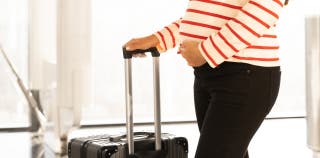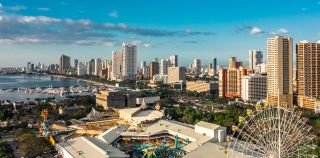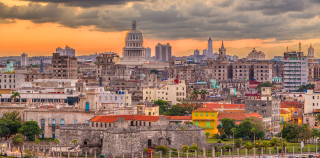- All travelers to Cuba are required to have health insurance, but U.S. plans are not accepted.
- Comprehensive travel insurance can provide the required medical coverage and help you cover the costs of trip delays, cancellations, and lost or stolen personal items.
- Cuba does not have the same safety standards or infrastructure as the United States, so travel insurance can be extremely useful after an accident.
- Travel insurance for Cuban tourists starts at around $7 per day, but your actual costs will vary.
- Try using our online comparison tool to find the right policy for your trip. Compare all your coverage options and find the best price to suit your needs.
On This Page
- Key takeaways
- Do I need travel insurance to visit Cuba?
- Our top picks for the best Cuba travel insurance
- Cuba travel information & requirements
- Why should I get travel insurance for Cuba?
- What types of coverage do I need to travel to Cuba?
- What isn’t covered by travel insurance for a trip to Cuba?
- How much does travel insurance for Cuba cost?
- Tips for buying the best travel insurance for Cuba
- FAQ: Travel insurance for Cuba
- Cuba travel insurance
On This Page
- Key takeaways
- Do I need travel insurance to visit Cuba?
- Our top picks for the best Cuba travel insurance
- Cuba travel information & requirements
- Why should I get travel insurance for Cuba?
- What types of coverage do I need to travel to Cuba?
- What isn’t covered by travel insurance for a trip to Cuba?
- How much does travel insurance for Cuba cost?
- Tips for buying the best travel insurance for Cuba
- FAQ: Travel insurance for Cuba
- Cuba travel insurance
Travel Insurance for Trips Cuba: Tips & Safety Info
Our top picks for the best cuba travel insurance
Our top picks for the best Cuba travel insurance
Detour Insurance
IMG
Travel Insured International
Do I need travel insurance to visit Cuba?
Cuban rules require all travelers to carry medical insurance for the duration of their trip. Your U.S.-based health insurance won’t work — you’ll need to buy separate coverage. At a minimum, the policy should provide medical coverage.
Many U.S. airlines automatically add insurance to your ticket price. American Airlines and United Airlines both charge $25 for a policy that’s active for 30 days. If you’re staying longer, you’ll need to buy extra coverage.
The Cuban government doesn’t publish specific insurance requirements. As a general rule, your policy should provide coverage for emergency medical care and evacuation.
Our top picks for the best Cuba travel insurance
Best Value Coverage
Detour Insurance
Best Rated for Travel Delay
IMG
Why We Like It
PROS
- Purchase your plan up until one day before you depart
- Generous limits for trip delays, emergency evacuation, and more
- Pre-existing condition waiver available if purchased within 20 days of initial trip deposit
- 24/7 emergency travel assistance included
- Coronavirus-related medical expenses covered
CONS
- Plan gets notably more expensive with age
Best for Non-Medical Evac Coverage
Travel Insured International
Why We Like It
PROS
- Travel delay coverage kicks in after just six hours
- Generous $150,000 non-medical evacuation coverage
- 24/7 emergency travel assistance included
CONS
- CFAR and IFAR coverage not included
- Baggage delay coverage only kicks in after 12 hours
- No rental car coverage
Cuba travel information & requirements
Cuban travel rules for Americans have changed several times in the last decade. Here’s a quick overview of the current requirements:
| Query | Details |
|---|---|
| Visa required for Americans | Yes; must fall under 12 approved categories |
| Allowed length of stay | 30 days |
| Passport requirements | 6 months validity from date of entry, 2 blank pages |
| U.S. health insurance accepted | No; Americans must have non-U.S. health insurance |
| Travel insurance requirements | Non-U.S. health insurance required |
| Vaccine requirements | None |
| Covid test required | No |
| Travel advisory level | Level 2: Exercise increased caution |
| Emergency services phone number | U.S. Embassy: +(53) (7) 839-4100 and dial 1 Ambulance: 104 Fire department: 105 Police: 106 |
| Local currency | Cuban pesos |
| Average 5-year exchange rate | 1 US dollar = 24.06 Cuban pesos |
Do I need a visa or passport to visit Cuba?
Americans need a passport and a license to visit Cuba. Your passport must be valid for a minimum of 6 months from the date you land. In addition, you should have two free passport pages to accommodate entry and exit stamps.
To travel to a Cuban city directly from the United States, you must qualify for a license from the Department of Treasury’s Office of Foreign Assets Control (OFAC). If your reason for travel falls into one of 12 approved categories — including family visits, journalistic activity, educational activities, or humanitarian projects — you can travel under a general license. You don’t need to apply for this license, but you should be able to prove that you meet the requirements for the appropriate category.
Need to visit for another reason? You must apply for a specific license from OFAC. Keep in mind that American citizens are not allowed to travel to Cuba from the United States purely for tourism.
COVID-19 restrictions
The Cuban government no longer requires incoming travelers to provide proof of a COVID-19 vaccine or a negative COVID-19 test.
Is it safe to visit Cuba?
It’s safe to travel to Cuba — just make sure you take normal precautions. The U.S. Department of State gives the country a Level 2 travel advisory, largely due to the potential for petty crime.
The Cuban security situation can change quickly. To get updates, sign up for the Smart Traveler Enrollment Program (STEP). Your STEP registration also helps the government find you and provide assistance in case of an emergency. When you’re in the country, the emergency numbers are 104 (ambulance), 105 (fire), and 106 (police), and you can always call the State Department’s 24-hour line for help.
Why should I get travel insurance for Cuba?
Risk of petty or violent crime
Petty crime is common in Cuba. Pickpocketing and theft of personal items are possible, both in public and in your hotel room. Use the same safety strategies you would in any major city. Don’t carry large amounts of cash, protect your wallet or bag, avoid flashy displays of wealth, and stay alert to your surroundings at all times. Theft can still happen, of course, and many travel insurance policies can reimburse you for stolen items.
Violent crime rates are low in Cuba. However, female travelers have reported incidents of harassment or assault. Stay safe by paying close attention to your drinks, staying away from isolated areas, and avoiding going out alone after dark. In the unlikely event that you’re attacked, travel insurance is critical for both treatment and repatriation to the United States.
Potential for demonstrations
You may run into demonstrations during your trip. Keep your distance — the government may respond with violence, as they did during widespread protests in 2021. Travelers should never participate in any type of demonstration; if you’re hurt in the process, your insurance may not pay. If you’re injured accidentally, however, a travel policy can help cover the costs of medical care and transportation.
Swimming safety
When you’re accustomed to the safety standards at beaches and pools in the United States, the conditions in Cuba may come as a surprise. Lifeguards aren’t always present, and rescue services might not be equipped to offer adequate assistance. As long as you’re not participating in water activities that the insurance provider excludes, your policy can be useful after a potential injury or accident.
Poor road safety conditions
Roads in Cuba tend to be poorly maintained, especially in rural areas. Safety standards aren’t the same as in the United States; drivers may not follow expected laws or procedures, and you may see livestock wandering freely. As a result, there is a risk of getting in an accident, damaging a rental car, or experiencing delays. Choose a travel insurance policy that helps make up any costs you incur as a result.
What types of coverage do I need to travel to Cuba?
Travel insurance for a Cuban trip usually falls into one of two categories:
- Medical-based travel insurance
- Comprehensive travel insurance
Coverage can vary significantly between these policies, so it’s important to understand the difference before you buy.
Medical-based travel insurance
These policies are designed to cover expenses for emergency medical treatment you need. It’s a good option if you need cheap travel insurance.
Most plans also provide coverage for medical evacuation. This is critical for trips to Cuba — hospitals are often underfunded, understaffed, and poorly supplied, so you may need to return home to get treatment. Because transport often happens on special medically equipped planes, it can be extremely expensive. Make sure your policy offers ample coverage.
Comprehensive travel coverage
Comprehensive travel insurance is an all-in-one option. In addition to medical coverage, it helps cover the costs in case of trip cancellation, delays, damaged personal items, and baggage loss.
Given the challenging economic conditions in Cuba and the country’s tense relations with the U.S. government, the situation on the ground can change rapidly. A comprehensive policy helps minimize your losses if something goes wrong.
Optional add-ons
Some insurance providers offer add-ons that expand your policy’s coverage. A common example is “cancel for any reason” (CFAR) coverage. With this add-on, you can get a partial reimbursement for non-refundable trip costs — even if your reason for cancellation isn’t covered under the original policy. So, if something comes up at work or a pre-existing health condition flares up, the trip won’t be a total loss.
What isn’t covered by travel insurance for a trip to Cuba?
In most cases, your travel insurance will not cover:
- Extreme sports
- Forecasted storms or natural disasters
- Routine medical care
- Pre-existing conditions
- Traveling against the advice of government agencies
How much does travel insurance for Cuba cost?
According to official sales data from Squaremouth, travel insurance for Cuba costs an average of $214.98.
Our official sales figures over the past year show that our customers paid an average of $123.35 for travel insurance to Cuba.
Cuba travel insurance is relatively expensive compared to other destinations close to the United States. We compiled a variety of quotes to help you understand what to expect. Each price below is for a 35-year-old from Illinois who’s visiting the country for 7 days at a price of $2,000.
| Provider | Plan | Cost | Medical expenses | Medical evacuation | Trip cancellation/interruption |
|---|---|---|---|---|---|
| Nationwide | Essential | $70.86 | $75,000 | $250,000 | $2,000/$2,500 |
| IMG | iTravelInsured Travel SE | $68.77 | $250,000 | $500,000 | $2,000/$3,000 |
| Travel Insured | Worldwide Trip Protector | $112.00 | $100,000 | $1,000,000 | $2,000/$3,000 |
| HTH Worldwide | TripProtector Classic | $82.44 | $250,000 | $1,000,000 | $2,000/$3,000 |
Based on these quotes, an insurance policy for a weeklong Cuban trip costs an average of $83.52. Your actual price could be considerably higher or lower depending on factors such as:
- Age
- State of residence
- Trip length
- Trip cost
- Number of travelers
Tips for buying the best travel insurance for Cuba
Buying the best travel insurance is a matter of making sure you’ve got the coverage you need. While there’s no one-size-fits-all solution, we’ve put together a list of the best tips to ensure you get the right coverage for your needs.
Look at how you’re planning to travel
Some travel insurance policies only cover certain modes of transportation.
Review your planned activities
Are you planning any adventure sports during your trip? Make sure your travel insurance covers each activity. If not, look into additional high-risk coverage.
Check with your airline
When you fly on a U.S. carrier, your ticket usually includes insurance. Review the coverage limits to make sure they meet your needs
Read your credit card terms
If you booked your trip with a credit card, read the benefits statement carefully. Certain cards offer coverage for trip cancellation, delays, interruption, and lost baggage
Look into flexible coverage options
Some providers offer extra services that expand your coverage and make it easier to get reimbursed




FAQ: Travel insurance for Cuba
Is travel insurance required to visit Cuba?
Yes — the country requires every tourist to have travel health insurance.
Can I use my U.S. health insurance in Cuba?
You cannot use your U.S. health insurance on a Cuban trip. Instead, you’ll need to purchase a separate policy that’s valid in Cuba.
How much is travel insurance for Cuba?
The cost of Cuba travel insurance varies based on your age, trip length, and place of residence. If you want coverage for cancellation or interruption, the policy will also account for the cost of the trip. On average, a 30-year-old can expect to pay around $83 to cover a weeklong Cuban trip.






























































